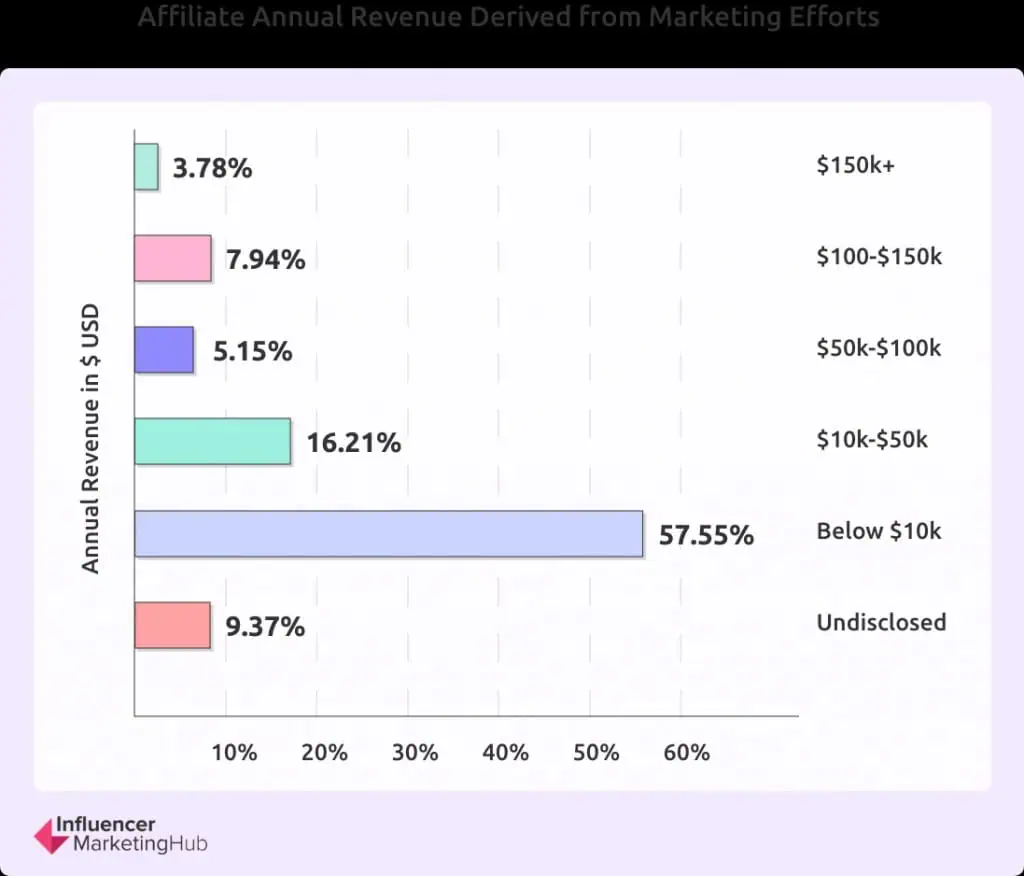What Is Affiliate Marketing?
REtipster does not provide legal advice. The information in this article can be impacted by many unique variables. Always consult with a qualified legal professional before taking action.
Shortcuts: Affiliate Marketing
- Affiliate marketing is income where a content professional earns commissions by promoting products through tracked links, with no upfront costs.
- The system works through tracking cookies that last several months, allowing creators to earn even if customers don’t buy immediately.
- Real estate professionals can promote tools they already use, such as property data services, screening software, and CRMs.
- Works naturally in real estate since investors and agents already recommend software and services they trust.
- Affiliate marketing creates solid supplemental income, but works best alongside your main business.
Understanding Affiliate Marketing
Affiliate marketing is a performance-based business model where companies pay commissions to individuals who refer new customers. The process works through unique tracking links that monitor referrals, sales, and commissions. When someone clicks an affiliate link and makes a purchase, the creator with that link earns a percentage of that sale.
This model powers many major online retailers. Affiliate marketing was present as early as 1989, but Amazon made e-commerce affiliate marketing available to the general public in 1996. Today, companies from software providers to education platforms use affiliate marketing to acquire customers, while content creators (bloggers, influencers, YouTubers, and more) make money by referring buyers.
The model involves four key parties:
- The merchant: the party that sells the product
- The affiliate: a content creator (you) who promotes the product on their content using your unique affiliate link
- The customer: the buyer that makes the purchase through the affiliate link
- Affiliate network: the platform that tracks sales and handles payments
Affiliate networks manage most programs, acting as intermediaries between merchants and affiliates. Networks like ShareASale, Impact, and CJ Affiliate provide tracking technology, process payments, and ensure accurate commission payments. Some larger companies, like BiggerPockets, run their own in-house affiliate programs instead.
Affiliate Marketing: What's Under the Hood?
Affiliate marketing operates through a tracking system that monitors referrals and sales. Here’s how it works from start to finish:
Tracking Methods
When you join an affiliate program, you receive a unique identifier (typically an affiliate ID) embedded in special URLs. These URLs contain parameters that track three key elements:
- The referral source (you)
- The specific product being promoted
- The marketing channel used
For example, a typical affiliate URL might look like:
www.productname.com/?affid=12345&source=email&campaign=spring
Cookies and Attribution
The tracking process begins when someone clicks your affiliate link. At this point, the merchant places a tracking cookie on the visitor’s device. These cookies usually remain active for 30-90 days, though some programs offer lifetime tracking.
The cookie system ensures you receive credit for sales even when customers take indirect paths to purchase. For instance, if someone clicks your link, leaves the site, then returns two weeks later to make a purchase, you still earn the commission. Many advanced programs even track across devices, so a mobile click that leads to a desktop purchase still counts.
Additionally, if the customer buys other products from the merchant during the cookie window, you often earn commissions on those sales too.
Payment Structures
Merchants structure affiliate payments in several ways to align with their business goals.
The most common model is pay-per-sale, where you earn either a flat rate or percentage of each purchase. Some programs prefer pay-per-lead, offering fixed payments for qualified sign-ups like free trial activations or demo requests.
Revenue share models create ongoing income by paying you a percentage of everything your referred customers buy. Multi-tier programs reward performance by increasing your commission rates as you generate more sales.
Some merchants combine these approaches into hybrid models. For example, paying both an upfront commission and a recurring percentage of future purchases.
Benefits of Affiliate Marketing
Affiliate marketing offers three key financial advantages, especially for real estate professionals.
Passive Income
First, it creates passive income through recurring commissions. For example, when you refer a user to a service’s monthly subscription and earn a 20% commission, that commission continues each month without additional work. Multiply this with, say, 50 from your audience, and you get a substantial amount of monthly income—all of it passive.
Seth explains in the video below how affiliate marketing is a good fit for real estate investors as a side hustle (6:34 in the video).
Credibility
Real estate professionals already hold a unique advantage in affiliate marketing because they can earn from tools they already use and trust. These include property management software, lead generation platforms, or real estate investment analysis, which are integral to real estate workflows. This makes it natural for professionals to recommend them to others in the industry or their clients.
By recommending tools you actually use in your business, you establish yourself as a knowledgeable resource.
In addition, nobody impulse-buys expensive software subscriptions or courses. Your firsthand experience helps others make informed decisions about significant purchases they plan to make anyway.
RELATED: Finding The Right Property Management Company
Diversification
Third, affiliate income diversifies your revenue beyond traditional real estate activities. While property deals might close irregularly, affiliate commissions provide steady monthly income. If you build a mix of software referrals ($20-100 per month each) and course sales ($200-500 per sale), you create consistent cash flow that isn’t tied to market conditions.
How to Start Affiliate Marketing in Real Estate
The key to successful affiliate marketing comes from your daily real estate work. Think about the tools you use every month. A wholesaler who looks at 50 potential deals uses different software than a property manager who oversees 200 units. Your experience with these tools matters more than anything else.
Start with the tools that have made your real estate business better. For example, if a property analysis platform helps you close more deals each month, or if tenant screening software has reduced your eviction problems, you’ve found something worth sharing.
Track exactly how these tools help you make more money or save time. These real results will help you show others why they should use the same tools.
Strategies to Boost Affiliate Income
Want to promote the tool that you’re using? Teach others how to use it.
New investors don’t just need software; they need to know how to analyze deals, estimate repairs, and calculate after-repair values. When you teach these basic skills while showing how certain tools make the work easier, you help people succeed while naturally promoting the products.
Share your actual work process. Walk through how you found your latest deal using a particular service and how you ran the numbers with your favorite calculator. Real examples work better than general reviews because they show exactly how tools help in real situations.
In addition, when someone buys through your link, that’s just the beginning. Help them set up the tool correctly, teach them advanced features, and create a space where users can share tips with each other. When you focus on helping people get results from the tools you recommend, they’ll trust your future recommendations and tell others about their success.
RELATED: 9 Real Estate Investment Tools and Software Every Investor Need to Know About
Common Mistakes to Avoid
Here are the main mistakes that hurt affiliate marketing success:
- Promoting tools you haven’t used yourself.
- Recommending expensive products just because they pay high commissions.
- Not telling your audience about affiliate relationships.
- Writing fake or copied reviews instead of sharing real experiences.
- Ignoring problems or limitations with the tools you promote.
- Dropping contact with users after they buy.
- Making promises about results without proof.
- Filling your content with too many affiliate links.
- Not updating old reviews when tools change.
- Choosing quantity over quality in your promotions.
Legal and Tax Considerations for Affiliate Marketing
Affiliate marketing means extra income, which means extra responsibility. Here’s what you need to know to stay out of trouble and handle your taxes correctly.
Affiliate Disclosures
Federal law requires affiliate disclosures, which means you need to tell people when you might make money from their purchases. You don’t need to wade deep into legalese, but be clear and upfront. Use direct, specific language.
At the start of your blog post or video, say something like: “Some links in this content earn me a commission at no extra cost to you.”
Add this disclosure before any affiliate links and/or in an easy-to-see spot. Do not hide it in any other content.
Tax Rules
The IRS considers affiliate income as self-employment income. Companies will send you a 1099 form if you earn more than $600 in affiliate income in a year. Even if you earn less, you still need to report it on your taxes. Learn more about what Form 1099 is in our comprehensive guide.
Keep records of:
- How much each company paid you
- When you received payments
- Which products earned commissions
- Your promotional expenses
It’s a good idea to set aside 25-30% of your affiliate earnings for taxes. This helps you avoid surprises when tax time comes.
State-Specific Rules
Some states have special rules about affiliate marketing, such as in California or New York.
In addition, about 30 states have “affiliate nexus” laws, which occurs when an out-of-state retailer has agreements with affiliates who directly or indirectly refer customers to the retailer, typically through internet links or other marketing methods.
Always check your state’s requirements or talk to a local tax advisor.
Protecting Yourself
Treat affiliate marketing like a business. Remember to:
- Keep business income separate from personal money.
- Save all payment records.
- Take screenshots of your disclosures.
- Keep copies of affiliate agreements.
Documentation matters. When you start making regular affiliate income, consider talking to a tax professional who can help you handle everything correctly.
REtipster’s Recommended Partners
REtipster is affiliated with several partners, some of which we use in our day-to-day. (Note: these are affiliate links, and we might earn a percentage of the sale if you decide to purchase their services).
Here are some of them:
- DataTree: A convenient and cost-effective data service for downloading mailing lists, researching properties, and more. We have a YouTube playlist for how to use DataTree; check it out!
- PropertyRadar: A data service that can be used in unique ways that no other data service can, with a price that’s hard to beat! Read our PropertyRadar review here.
- Pebble: Pebble can manage your entire acquisition and marketing process with an easy-to-use interface. Read our Pebble review here.
- OpenPhone: A cloud-based phone solution that can screen calls, take messages, send and receive texts, set up toll-free numbers, and more. Read our OpenPhone review here.
- PATLive: A virtual receptionist service that allows business owners to outsource the work of answering phone calls. Read our PATLive review here.
- Carrot: Carrot allows real estate professionals to quickly and easily build websites for buying and selling properties and more. Read our Carrot review here.
- Relay: Relay is a business banking and money management platform that can manage your business’s cash flow. Read our Relay review here.
- Fiverr: A huge online marketplace that allows entrepreneurs to find freelancers for pretty much any type of service. Read our Fiverr review here.
For the full list of our affiliates and partners, check out REtipster’s Tools and Resources section.
Frequently Asked Questions: Affiliate Marketing
What are the most profitable affiliate programs for real estate professionals?
Educational products typically offer the highest commission rates, ranging from 30-50% per sale. Software subscriptions provide lower initial commissions but often include recurring payments that build sustainable income. Meanwhile, property data platforms average 15-30% commission but attract consistent buyer interest.
How do I disclose affiliate links in my real estate content?
Federal regulations require clear disclosure of affiliate relationships. Include a prominent notice before any affiliate links, explaining that you may earn a commission from purchases. Add a general disclosure policy to your website and mention affiliate relationships in video content.
Can affiliate marketing replace income from real estate investments?
While affiliate marketing can generate substantial revenue, it works best as a complement to real estate investing rather than a replacement.
Some affiliate marketers can earn substantial incomes, but most earn under $10,000 per year. Only 5% of affiliate marketers reportedly earn over $50,000 annually, indicating that while high earnings are achievable, they are not common for everyone.

Image and report by the Influencer Marketing Hub
In addition, affiliate marketing does not guarantee consistent income. Earnings can fluctuate based on various factors, including market trends and changes in affiliate program terms.
For this reason, many successful affiliates recommend starting part-time while maintaining other income sources until you can confidently transition to full-time affiliate marketing.
References
- LinkedIn, “A Brief History of Affiliate Marketing (1989-2015).” https://www.linkedin.com/pulse/brief-history-affiliate-marketing-1989-2015-someshwer-cherukure/
- Affiverse, “Understanding Cookie Duration in Affiliate Marketing.” https://www.affiversemedia.com/understanding-cookie-duration-in-affiliate-marketing/
- Affilorama, “Unlocking the Power of Pay Per Sale: A Step-by-Step Guide to Profitable Affiliate Marketing.” https://www.affilorama.com/pps-affiliate-programs
- CrakRevenue, “Pay-Per-Lead: What Does PPL Mean in Affiliate Marketing?” https://www.crakrevenue.com/blog/what-is-pay-per-lead-ppl/
- Federal Trade Commission, “FTC’s Endorsement Guides: What People Are Asking.” https://www.ftc.gov/business-guidance/resources/ftcs-endorsement-guides-what-people-are-asking
- GoAffPro, “Tax Implications for Affiliate Payments [US].” https://docs.goaffpro.com/affiliate-payments/settings/tax-implications-for-affiliate-payments-us
- California Legislative Information, “AB-155 State Board of Equalization: administration: retailer engaged in business in this state.” https://leginfo.legislature.ca.gov/faces/billNavClient.xhtml?bill_id=201120120AB155
- Casetext, “N.Y. Comp. Codes R. & Regs. tit. 9 § 5329.37.” https://casetext.com/regulation/new-york-codes-rules-and-regulations/title-9-executive-department/subtitle-t-new-york-state-gaming-commission/chapter-iv-division-of-gaming/subchapter-b-casino-gaming/part-5329-sports-wagering/section-532937-advertising-marketing-and-promotions
- Avalara, “Affiliate nexus laws by state.” https://www.avalara.com/us/en/learn/guides/state-by-state-affiliate-nexus-guide-avalara.html
- AffMaven, “14 Best Real Estate Affiliate Programs to Make Money [2025].” https://affmaven.com/real-estate-affiliate-programs/
- Ahrefs, “Here’s How Much You Can Really Make From Affiliate Marketing.” https://ahrefs.com/blog/affiliate-marketing-income/











